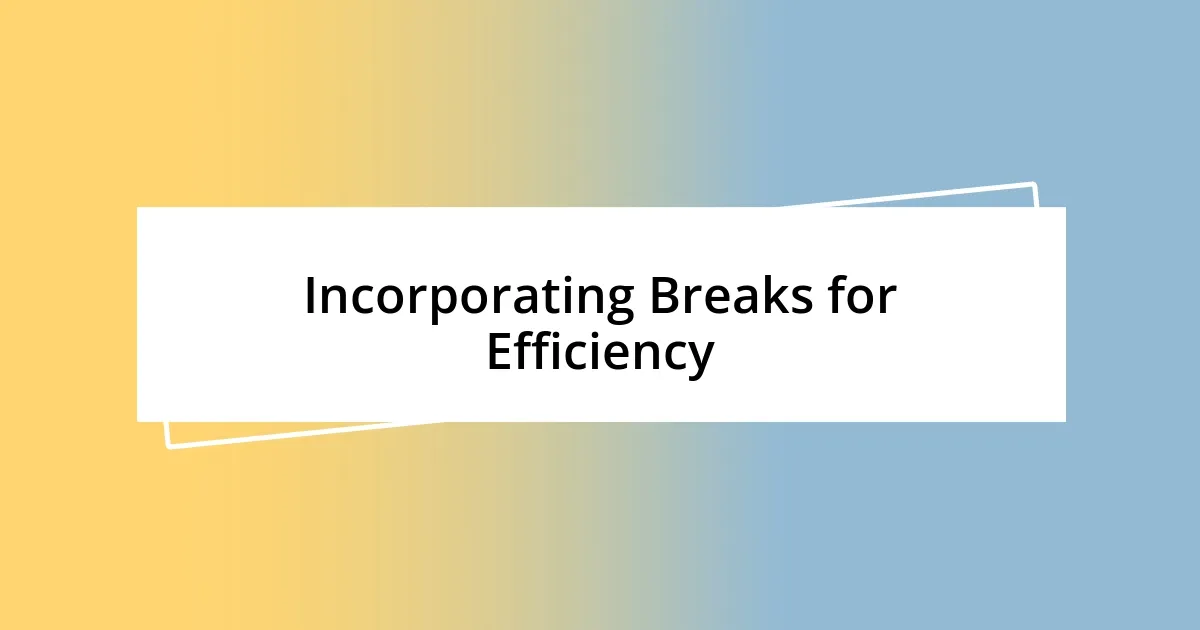Key takeaways:
- Establishing a consistent writing routine enhances creativity and helps organize thoughts.
- Key elements for an effective writing routine include setting specific goals, creating a distraction-free environment, and incorporating flexibility.
- Taking breaks during writing sessions boosts efficiency and can inspire new ideas.
- Tracking progress and adjusting writing goals fosters growth and rejuvenates passion for writing.

Understanding Writing Routine Benefits
Having a consistent writing routine is like having a trusted friend by your side. It creates an environment where creativity can flourish. I remember when I started setting aside the same time each day to write; it felt almost magical to see the words flow more easily. Isn’t it fascinating how routine can transform what sometimes feels like a chore into a joyous habit?
One significant benefit of a writing routine is the structure it provides. By carving out dedicated writing time, I’ve noticed that my thoughts become more organized and focused. A few years back, I struggled with chaotic ideas bouncing around in my head. Establishing a routine helped me channel those thoughts more clearly. Have you ever faced a similar challenge?
Additionally, writing regularly builds confidence over time. There was a period when I second-guessed every word I typed. But as I stuck to my routine, I started feeling more assured in my voice. The consistency not only improved my skills but also helped me embrace my unique perspective. Isn’t it empowering to find your rhythm?

Key Elements of Effective Routines
When it comes to creating an effective writing routine, consistency is crucial. I’ve found that sticking to the same time each day not only establishes a rhythm but also signals to my brain that it’s time to get into “writing mode.” This has led to an unexpected sense of clarity; I can dive right into my creative flow rather than wasting time figuring out where to start.
Key elements to consider for a successful writing routine:
- Set specific goals: Break down your writing tasks into manageable chunks to stay focused.
- Create a conducive environment: Find a space that inspires you and minimizes distractions.
- Establish a time: Choose a time of day when you feel most creative, whether it’s early morning or late at night.
- Build flexibility: Allow room for adjustments to maintain motivation without feeling rigid.
- Incorporate rituals: Whether it’s a cup of coffee or a particular playlist, these small rituals can signal to your brain that it’s time to write.
I remember struggling with distractions early on. I’d sit down to write, but my phone would buzz, or the laundry would beckon. Developing a habit, coupled with a distraction-free environment, shifted my focus dramatically. It felt liberating to immerse myself fully in the writing process, resulting in more genuine and heartfelt creations.

Establishing a Consistent Schedule
Establishing a consistent writing schedule is one of the best decisions I’ve made as a writer. I’ve experienced days where I struggled to find the right words, but when I adhered to my set time, those moments dwindled. It’s almost as if my mind knows that when that clock strikes a certain hour, it’s time to switch gears and create. Have you ever felt that shift when you simply honor a commitment to yourself?
I recall a particularly chaotic period in my life when juggling daily agendas made writing feel like a chore rather than a passion. I decided to wake up thirty minutes earlier than usual to dedicate that time solely to my writing. At first, my bed called to me like it always did, but soon I began to treasure those quiet morning moments. It became a sacred ritual that I looked forward to—a peaceful start before the world awakened. Isn’t it amazing how a slight shift in timing can rejuvenate your creative spirit?
In my experience, I’ve discovered that treating writing like a scheduled appointment can significantly enhance productivity. Just as you wouldn’t skip a meeting with a client, honoring your writing time can reinforce your commitment. I remember when I began marking my writing sessions in my calendar, and suddenly those blocks of time transformed into non-negotiable “dates” with my passion. The feelings of guilt for not writing diminished, replaced by anticipation and enthusiasm. Can you relate to that feeling of anticipation?
| Aspect | Details |
|---|---|
| Consistency | Write at the same time daily to establish a writing rhythm. |
| Flexibility | Allow adjustments to prevent burnout while maintaining your core schedule. |
| Environment | Create a dedicated space free from distractions to focus your thoughts. |
| Goals | Set manageable writing targets to maintain motivation and clarity. |

Incorporating Breaks for Efficiency
Incorporating breaks into your writing routine isn’t just a luxury; it’s a crucial part of staying efficient. Personally, I’ve found that stepping away for even just five minutes can work wonders. It’s during these short breaks that I often find clarity. Have you ever returned from a short walk only to be met with a fresh wave of ideas? I know it’s happened to me many times.
At one point, I was so focused on squeezing every ounce of productivity from my writing sessions that I overlooked the power of rest. I remember pushing through hours of writing, only to find that my creativity was stifled by fatigue. Now, I set a timer for about 25 minutes of concentrated writing followed by a 5-minute break. This technique, sometimes called the Pomodoro Technique, allows me to recharge mentally and physically. Honestly, I didn’t expect such a simple method to completely shift my writing experience.
Reflecting on my writing journeys, I can’t help but emphasize how breaks serve not only to rest but also to inspire. When I’m stuck on a challenging section, stepping outside to breathe in some fresh air often sparks the clarity I need. Have you ever noticed how your best ideas seem to surge right after a moment away from your desk? It’s a testament to the idea that creativity flourishes when our minds are allowed the space to wander.

Creating a Productive Writing Environment
Creating a dedicated writing space has been a game changer for me. I remember when I used to write on my couch, surrounded by distractions like the TV or laundry that needed folding. Once I set up a small corner in my room with just a desk and a comfortable chair, everything changed. Finally, I had a space specifically designed for creativity, free from interruptions. Have you ever tried creating a zone just for your writing? It can really help you focus.
Sometimes, it’s the little touches that make a writing environment feel more inspiring. I’ve added personal elements to my space, like photos from memorable trips and a small plant that reminds me of nature. These things spark joy and motivate me to write. I often ask myself, what do I need around me to feel energized and engaged? It’s about creating an atmosphere that resonates with your inner voice, allowing you to channel your thoughts more freely.
Of course, it’s essential to keep your writing area organized. Clutter can easily distract you, pulling your mind in different directions. When I transitioned to a minimalistic setup, I realized that a clean space leads to a clearer mind. How much easier is it to dive into your creative flow without the weight of chaos around you? I can’t stress enough how a little tidiness can breathe new life into your writing sessions.

Overcoming Common Routine Challenges
Maintaining a consistent writing routine can be tough, especially when life throws unexpected challenges our way. I’ve had days when I had every intention to write, only to be derailed by meetings or family obligations. The key for me is to remain flexible; I often schedule my writing at different times throughout the day. Have you tried adjusting your routine to fit in those unexpected interruptions? Sometimes, you just have to let go of rigidity and adapt, so you don’t lose your creative spark.
One persistent challenge I’ve faced is staying motivated when the ideas just don’t seem to flow. I’ve had those frustrating moments, staring at a blank page, feeling like I’m pushing against a wall. To conquer that, I find inspiration by revisiting old favorites—be it a book, a song, or even a conversation. Have you noticed how familiar stimuli can ignite your creativity? It reminds me that inspiration is all around us, waiting to be tapped into.
Another hurdle is dealing with self-doubt. I’ve often struggled with feeling inadequate compared to others in my field. Connecting with fellow writers through online communities has truly helped me overcome this. I’ve realized I’m not alone in my struggles; talking about these feelings not only validates my experience but often leads to practical solutions. Isn’t it incredible how sharing our challenges can foster a supportive network that helps us thrive?

Tracking Progress and Adjustments
Tracking your writing progress is like holding up a mirror to your creative journey. When I decided to keep a writing journal, I was shocked by how much clarity it brought. Reading through old entries not only highlighted my growth but also showed me the twists and turns my writing took. Do you keep track of your progress? It can be enlightening to quantify your achievements, whether it’s word count or completed projects.
Adjustments are an essential part of any writing routine. I remember a period when my daily word count dwindled, leaving me feeling frustrated. Instead of giving up, I revisited my writing goals and realized I’d overcommitted to deadlines, pushing my creativity to the brink. Have you ever found yourself overwhelmed by lofty expectations? Sometimes, stepping back and tweaking your schedule can rejuvenate your passion and bring back that excitement for writing.
Lastly, I find it beneficial to regularly revisit my writing goals. Reflecting on what worked and what didn’t allows me to pinpoint changes that have made a difference. One time, I adjusted my writing time after discovering I was far more productive in the evenings than in the morning. What about you? Have you ever experimented with different times, only to discover a hidden gem that boosts your creativity? Tracking progress and making thoughtful adjustments can lead to a more fulfilling and fruitful writing experience.














